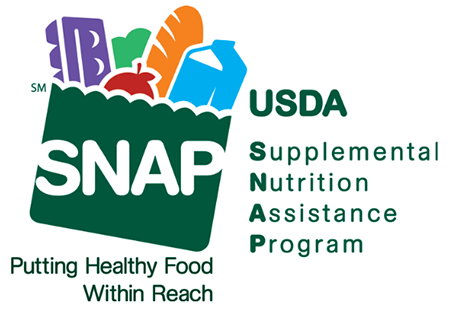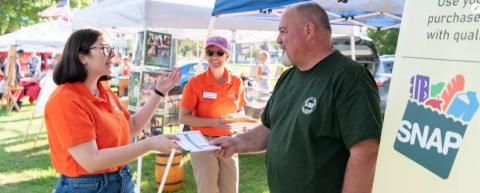SNAP-Ed supports NH schools serving the highest populations of low-income students with essential resources, evidence-based tools, and technical support they might not otherwise be able to afford or access.
In FY24, SNAP-Ed teachers delivered classroom and afterschool nutrition education using evidence-based curricula and hands-on activities, reaching 1,545 K–12 students across all 10 NH counties.
In Manchester, 11 schools, serving nearly 6,000 students, are implementing a strengthened wellness policy that guarantees at least 20 minutes to eat lunch, ensures six annual nutrition lessons, and requires staff training in nutrition education.
NH SNAP-Ed, NH Hunger Solutions and New England Dairy Council co-lead the annual NH School Breakfast Challenge, which aims to boost student breakfast participation. School breakfast provides consistent, nutritious meals that low-income students rely on, and yet participation in NH is among the lowest in the country. Read More >
- At Dr. Norman W. Crisp Elementary in Nashua, all 385 students participated in school-wide breakfast events, increasing engagement and helping to reduce the stigma associated with school meals.
SNAP-Ed partners with NH Food Bank and local food pantries to increase food & nutrition security for NH’s most vulnerable families.
NH SNAP-Ed co-leads the NH Nutrition Pantry Program, providing coaching and resources to food pantries across the state to expand their capacity and promote client-centered food distribution.
In FY24, 15 NH food pantries partnered with SNAP-Ed to implement 61 changes aimed at improving nutrition access for their clients. Read More >
SNAP-Ed helps New Hampshire families stretch their SNAP benefits by doubling their SNAP dollars on local, fresh fruits and vegetables—saving money, boosting nutrition, and supporting local farmers and independent grocery stores.
- In FY24, SNAP-Ed promotion efforts for Granite State Market Match and Double Up Food Bucks reached an estimated 12,128 people who might not have been reached otherwise.
SNAP-Ed supports NH’s littlest learners, improving health at a crucial moment in development with Head Start sites.
SNAP-Ed staff and UNH Dietetic Interns teach nutrition and physical activity lessons to NH preschoolers, encouraging them to be active together and try new fruits and vegetables. link here
SNAP-Ed provides resources and technical assistance to NH early childhood educators to incorporate evidence-based nutrition education and physical activity into their classroom routine.
NH SNAP-Ed partners with the New England Regional Farm to ECE coalition to connect Head Starts to local food procurement and gardening opportunities. Read More >
SNAP-Ed supports gardens in lower-income NH communities to increase access to fruits and vegetables, provide nutrition education, and promote overall health & well-being.
In FY24 SNAP-Ed supported 11 NH school and community gardens, providing hands-on educational opportunities to build food & nutrition security and bring communities together. Read More >
“When kids grow it themselves, they want to eat it. When they cook with it, they begin to understand it’s value. Through SNAP-Ed supported programs, students are exposed to healthy foods in a fun, interactive way – building positive habits that can last a lifetime.” ~ NH Teacher
- At Concord Head Start, SNAP-Ed helped establish an on-site garden that now provides nutrition education opportunities and fresh produce to children and families.
- In Berlin, SNAP-Ed supports pre-K and elementary school students with hands-on opportunities to grow vegetables in their classroom using hydroponic units, combined with nutrition education - transforming how children understand and appreciate food.
SNAP-Ed helps NH seniors live free and age well.
In FY24 SNAP-Ed led 14 Walk with Ease programs across NH, helping participants increase their brisk walking by 72%.
- When Rosie participated in Walk With Ease, she fulfilled her mission to leave her wheelchair behind and reclaim her mobility, strength, and independence. By Week 6, Rosie had developed a routine, built her confidence, and rediscovered a sense of joy and purpose in her daily life. Rosie’s transformation wasn’t just physical; it was also emotional. Read More >
In Nashua, SNAP-Ed has developed a comprehensive support system serving over 100 low-income seniors across four housing sites, offering nutrition and wellness programs along with access to nutritious food, including local, fresh produce. Read More >
In FY24 SNAP-Ed launched a new “Boost Your Brain & Memory” program, teaching participants to make lifestyle changes such as increasing physical activity and improving nutrition, to support brain health and healthy aging.
- Participants increased physical activity by 28% and consumption of vegetables by 38%.
SNAP-Ed leadership & facilitation helps NH communities increase access to nutritious food through collective impact.
SNAP-Ed leads the Carroll County Food Access Network (CCFAN), a coalition of over 25 organizations working together to increase access to affordable, nutritious food for all people by supporting the local food system. Following a community needs assessment, CCFAN expanded access to summer meals for underserved youth in 2024 and will build on this success in 2025. Read More >
Through its leadership of the Healthy Living Workgroup of the Strafford County Public Health Network, SNAP-Ed supports healthcare sites in implementing food insecurity screenings and connecting people to food assistance resources.
SNAP-Ed is launching the first statewide NH Farm to Early Childhood Education Coalition.
- Check out this video from our CT SNAP-Ed partners to learn more about Farm to ECE.
NH SNAP-ED publishes new page that highlights how the program improves health outcomes in New Hampshire.
Check out SNAP-Ed Works for New Hampshire page
The University of New Hampshire Extension is an equal opportunity educator and employer. UNH, U.S. Department of Agriculture, and New Hampshire counties cooperating. Direct inquiries to unh.civilrights@unh.edu. USDA this institution is an equal opportunity provider. The preparation of this document was financed under a contract with the State of New Hampshire, Department of Health and Human Services. This material was funded by USDA’s Supplemental Nutrition Assistance Program – SNAP.




